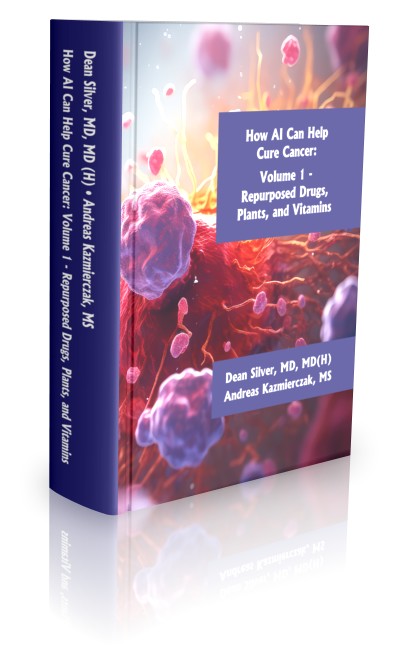In "Revolutionizing Cancer Care with AI - Volume 1: Repurposed Drugs, Plants, and Vitamins", Dr. Dean Silver and AI scientist Andreas Kazmierczak explore the groundbreaking role of artificial intelligence in integrative cancer treatment. This book reveals how AI-driven analysis is revolutionizing cancer care by identifying the most effective repurposed drugs, plants, and vitamins to combat the disease.
Dr. Silver, a leading integrative oncologist, shares his personal journey of overcoming cancer and staying in remission for 25 years using innovative, non-toxic therapies. Kazmierczak, an expert in AI, has trained the CANCERASE AI on over 300,000 pages (as of February 2025) of medical data, offering a powerful tool for personalized cancer treatment. Together, they present a cutting-edge approach that moves beyond conventional high-dose chemotherapy, reducing harmful side effects while improving outcomes.
With rapid advancements in AI and major investments in medical technology, this book provides hope and practical guidance for those seeking smarter, more effective cancer treatments.
This book represents a new genre in medical literature—an AI-validated, evidence-based compendium of cancer research. Unlike conventional medical texts, it merges the power of artificial intelligence with extensive scientific validation to create a dynamic, up-to-date resource for cancer treatment. It is neither purely academic nor solely practical; instead, it bridges the gap between cutting-edge research and clinical application, providing a definitive, data-driven approach to oncology.
This book is a groundbreaking reference in the field of cancer treatment, providing an unbiased, scientifically validated overview of the latest advancements in oncology. Unlike traditional books, this work is entirely grounded in scientific evidence, ensuring that every statement and recommendation is backed by rigorous research. The content is verified using our proprietary medical AI (CANCERASE GPT, visit cangpt.ai), which has been trained on over 300,000 pages of research proceedings and scientific materials.
A must-read for patients, caregivers, and medical professionals looking to harness AI in the fight against cancer.
